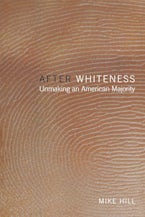After Whiteness
Unmaking an American Majority
As each new census bears out, the rise of multiracialism in the United States will inevitably result in a white minority. In spite of the recent proliferation of academic studies and popular discourse on whiteness, however, there has been little discussion of the future: what comes after whiteness? On the brink of what many are now imagining as a post-white American future, it remains a matter of both popular and academic uncertainty as to what will emerge in its place.
After Whiteness aims to address just that, exploring the remnants of white identity to ask how an emergent post-white national imaginary figure into public policy issues, into the habits of sexual intimacy, and into changes within public higher education. Through discussions of the 2000 census and debates over multiracial identity, the volatile psychic investments that white heterosexual men have in men of color—as illustrated by the Christian men's group the Promise Keepers and the neo-fascist organization the National Alliance—and the rise of identity studies and diversity within the contemporary public research university, Mike Hill surveys race among the ruins of white America. At this crucial moment, when white racial change has made its ambivalent cultural debut, Hill demonstrates that the prospect of an end to whiteness haunts progressive scholarship on race as much as it haunts the paranoid visions of racists.
Contributor Bios
Reviews
"A lucid, fiercely argued, brilliantly conceived, richly provocative work in an emergent and growing area of cultural studies. After Whiteness sets new directions in American literary and cultural studies, and will be become a landmark in the field." ~ Sacvan Bercovitch,Harvard University
 This work is licensed under a
Creative Commons Attribution-NonCommercial-ShareAlike 4.0 International License
(CC BY-NC-SA).
This work is licensed under a
Creative Commons Attribution-NonCommercial-ShareAlike 4.0 International License
(CC BY-NC-SA).


